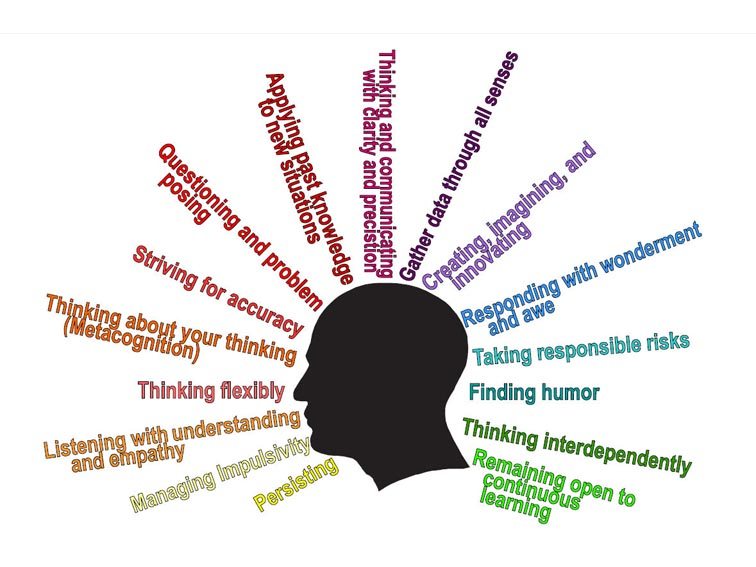In their groundbreaking book, Habits of Mind, Arthur Costa and Bena Kallick, identify a set of 16 problem solving, life related skills, necessary to effectively operate in society. These skills promote strategic reasoning, insightfulness, perseverance, creativity, and craftsmanship.
One goal behind these life skills is to provide a road map as to how to behave intelligently when you DON’T know the answer. It means having a disposition toward intelligent behavior when confronted with problems or new learning.
The application of these 16 Habits of Mind will help you work through real life situations. They are as follows:
- Persisting: Sticking to a task at hand. Following through to completion. Can and do remain focused.
- Managing Impulses: Taking time to consider options. Thinking before speaking or acting. Remaining calm when stressed or challenged.
- Listening with Understanding and Empathy: Paying attention to not dismissing another person’s thoughts, feeling and ideas. Seeking to put yourself in another person’s shoes. Holding thoughts at a distance in order to respect another person’s point of view and feelings.
- Thinking Flexibly: Being able to change perspective and consider the input of others. Generate alternatives and weighing options to make better decisions.
- Thinking about Thinking (Metacognition): Being aware of one’s own thoughts, feelings, intentions and actions. Are willing to consider the impact of your choices on yourself and others.
- Striving for Accuracy: Being able to check for errors. Nurturing a desire to do something well.
- Questioning and Posing Problems: Asking yourself, “How do I know?”, developing a questioning attitude. Considering what information is needed, choosing strategies to get that information, and considering the obstacles that will eventually come to solve a problem.
- Applying Past Knowledge to New Situations: Using what you’ve learned, considering prior knowledge and experience, and applying that knowledge.
- Thinking and Communicating with Clarity and Precision: Striving to be clear when speaking and writing.
- Gathering Data through All Senses: Stop to observe what you see, listen to what you hear, take note of what you smell, taste what you’re eating, and feeling what you touch.
- Creating, Imagining, Innovating: Thinking about how something might be done differently from the “norm.” Proposing new ideas. Striving for originality.
- Responding with Wonderment and Awe: Intrigued by the world’s beauty. Being open to the little and big surprises in life that you see in yourself and others.
- Taking Responsible Risks: Willing to try something new and different. Facing fear of making mistakes or of coming up short and not letting it stop you.
- Finding Humor: Looking for the whimsical, absurd, ironic, and unexpected in life. Being able to laugh at yourself and not take yourself too seriously.
- Thinking Interdependently: Willing to work with others and welcome their input and perspective. Being able to abide by decisions the work group makes even if you disagree. Willing to learn from others.
- Remaining Open to Continuous Learning: Being open to new experiences to learn from. Proud and humble enough to admit when you don’t know something. Welcoming new information on all subjects.
(Source: Arthur L. Costa and Bena Kallick, Habits of Mind: A Developmental Series, Copyright © 2000)
Do you have good habits of mind? What are the ones that you’d like to incorporate into your life? Did you notice that many of these habits are natural for HSPs? Which ones do you struggle with? I’m interested in any thoughts or comments that you have.

